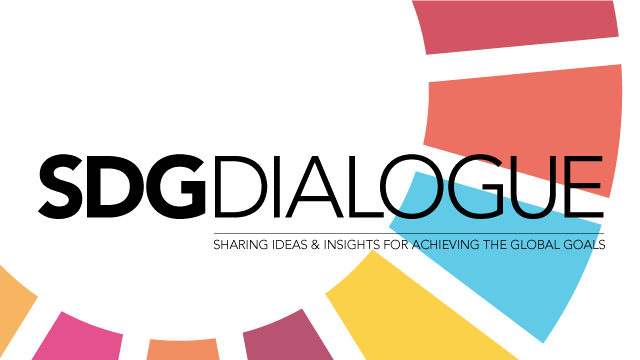2016-10-05

This SDG Dialogue event will consider the role of regional organizations in achieving the Sustainable Development Goals (SDGs), focusing on building effective links between science and policy. Panelists and participants will exchange experiences and insights, addressing questions such as:
1. What is the role of regional bodies such as UNESCAP in reconciling the global vision of the SDGs with regional and national priorities?
2. How can such regional bodies coordinate the formulation of a science–policy interface to enhance the capacity of policymakers?
3. How can a regional science–policy interface contribute to policymaking at the global level?
This event will be held in English and Japanese, with simultaneous translation provided.
Background
Among the key challenges for achieving the SDGs is translating the global goals into regional and national priorities. Coherent approaches are needed for specific local, national and regional contexts, seeking integrated solutions to problems as diverse as poverty, climate change and education. Researchers and policymakers are struggling to identify synergies and trade-offs related to SDGs and their targets. An effective science–policy interface, as well as sufficient capacity, are both prerequisites for integrated implementation. A lack of capacity also undermines the collection and flow of information for monitoring and review of efforts to achieve the SDGs. Addressing these challenges requires regional institutions to play an integral role in formulating effective science–policy interfaces, as well as in developing capacity in their regions.
The SDG Dialogue Series
This event series brings experts together to share ideas and insights for achieving the SDGs. Each event promotes dialogue and networking between panellists and participants, through an interactive discussion session and an informal reception.
Date
13 October 2016 (14:00–16:30)
Venue
Elizabeth Rose Conference Hall, United Nations University 5F
5-53-70 Jingumae, Shibuya-ku, Tokyo 150-8925 (Access)
Registration
This event is open to the public, but advance registration is required (by 5 pm on 12 October).
To register, please click on HERE to access the online registration page.
Organizer
United Nations University Institute for the Advanced Study of Sustainability (UNU-IAS)
Co-organizer
Sustainable Development Solutions Network Japan(SDSN Japan)
Supporter
Global Environment Outreach Centre(GEOC)
Programme
14:00–14:05 Opening Remarks
・Kazuhiko Takemoto (Director, UNU-IAS)
14:05–14:10 Introduction
・Farai Kapfudzaruwa (Postdoctoral Fellow, UNU-IAS)
14:10–14:45 Keynote Speech
・Katinka Weinberger (Chief, Environment and Development Policy Section, United Nations Economic and Social Commission for Asia and the Pacific)
14:45–16:20 Panel Discussion
・Moderator: Norichika Kanie (Senior Research Fellow, UNU-IAS; Professor, Graduate School of Media and Governance, Keio University)
Panellists:
・Katinka Weinberger
・Atsushi Ishii (Associate Professor, Centre for Northeast Asian Studies, Tohoku University)
・Hein Mallee (Director, Regional Centre for Future Earth in Asia; Professor, Research Institute for Humanity and Nature)
・Shunji Matsuoka (Professor, Graduate School of Asia Pacific Studies, Waseda University)
Interactive Discussion
16:20–16:30 Concluding Remarks
・Norichika Kanie
* After the dialogue there will be an informal reception, providing opportunities for further discussion and networking (until 17:00).
 「SDG Dialogue 13 October 2016 – Flyer (EN)」PDF Download
「SDG Dialogue 13 October 2016 – Flyer (EN)」PDF Download
2016-09-30

SDGダイアログでは、持続可能な開発目標(SDGs)の達成に向けて、地域機構の役割について話し合います。科学的知識と政策とのよりよい相互関係を考えることを主題としながら、とくに次のような問題について、ゲストと参加者の皆様のあいだで議論を深めます。
1. 国際的な目標であるSDGsと、アジア・太平洋地域における優先課題との折り合いをつけるために、国連アジア太平洋経済社会委員会(ESCAP)のような地域機構はどのような役割を果たせるでしょうか。
2. 地域機構は、政策立案者の能力を高めるために、どのようにして科学的知識と政策とのよりよい相互関係を考えることができるでしょうか。
3. 科学的知識と政策とのよりよい相互関係を考えることは、より広い国際的なレベルでの政策の立案に対して、どのように活用できるでしょうか。
なお、本イベントは、日本語と英語の同時通訳があります。
背景
2030年までに達成すべき目標として、2015年9月に国連本部で採択された「持続可能な開発目標(SDGs)」は、いよいよ実施段階に入りました。国際的目標であるSDGsを、地域や国の優先課題に落とし込んでいかなければなりません。地域・国・地方のレベルでの目標として、貧困・気候変動・教育などの多様な問題を統合的に解決するためには、一貫性のあるアプローチが必要となります。現在、各国の研究者と政策立案者たちは、SDGsと地域的目標との間の相乗効果や生じうる代償を見極めることに奮闘しています。科学的知識と政策とのよりよい相互関係を考えることと、人々に十分な能力があることは、ともにSGDsの統合的な実施のための必須条件となります。人々に十分な能力がなければ、SDDGsを達成するための努力を評価したり、モニタリグしたりするための情報の流れが滞ってしまうためです。こうしたことから、地域における能力開発を進め、科学的知識と政策とのよりよい相互関係を考えるために、地域機構がしっかりと役割を担うことが求められています。
SDGダイアログ・シリーズ
SDGダイアログ・シリーズでは、様々な専門家をお迎えして、それぞれの立場からSDGsの達成に向けたアイデアをお話いただきます。議論の場とその後の交流の場を通して、ゲストと身近な距離で対話をすることができます。
日時
平成28年10月13(木)14:00-16:30(開場13:30)
場所
国連大学エリザベス・ローズ国際会議場(渋谷 国連大学ビル5階 アクセス)
参加登録
入場は無料ですが、事前登録が必要です。参加のご登録は、こちらの登録ページからお願いいたします。
(2016年10月12日午後5時まで)
主催
国連大学サステイナビリティ高等研究所(UNU-IAS)
共催
持続可能な開発ソリューション・ネットワーク・ジャパン (SDSN Japan)
協力
地球環境パートナーシッププラザ(GEOC)
プログラム
14:00–14:05 開会挨拶
_____・竹本 和彦(UNU-IAS所長)
14:05–14:10 趣旨説明
_____・ファライ・カプザルワ(UNU-IASポストドクトラルフェロー)
14:10–14:45 基調講演
_____・カティンカ・ウェインバーガー(国連アジア太平洋経済社会委員会チーフ)
14:45–16:20 パネルディスカッション
モデレーター: 蟹江 憲史(UNU-IASシニアリサーチフェロー、慶應義塾大学教授)
パネリスト:
_____・カティンカ・ウェインバーガー
_____・石井 敦(東北大学東北アジア研究センター准教授)
_____・ハイン・マレー(Future Earthアジアセンター事務局長、
_____ 総合地球環境学研究所教授)
_____・松岡 俊二(早稲田大学大学院アジア太平洋研究科教授)
_____質疑応答および参加者とのディスカッション
16:20–16:30 閉会挨拶
_____ ・蟹江 憲史
* 終了後、交流の場をご用意しています。(17時まで)
 「SDGダイアログ:地域機構と持続可能な開発目標(SDGs)— 科学と政策、能力形成」PDF Download
「SDGダイアログ:地域機構と持続可能な開発目標(SDGs)— 科学と政策、能力形成」PDF Download